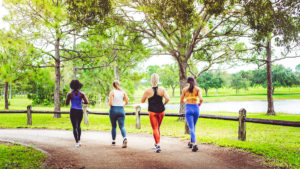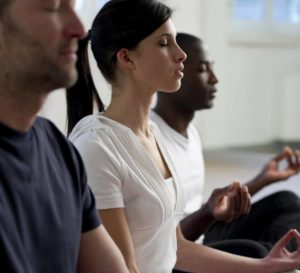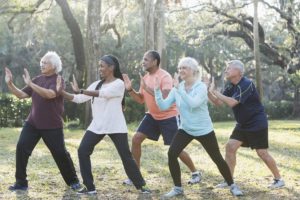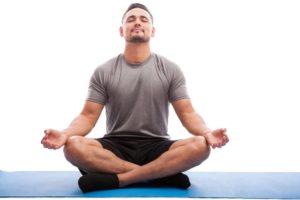Mindfulness & Meditation
Social Connectedness, Strengthening Bonds, Strengthening Health
The fundamental human need for social connection is as intrinsic as the need for food and shelter. This innate desire to form meaningful relationships profoundly influences overall health and well-being….
The Nature Prescription
It’s easy to feel stressed, distracted, or even disconnected with today’s uncertainties and fast-paced society. But there’s one powerful solution that doesn’t cost anything and is right outside your door:…
Time Spent Outdoors Boosts Health, Fitness, and Well-Being
In an increasingly digital and fast-paced world, the call of the wild is more than poetic—it’s essential to human health. Emerging research shows that spending time outdoors is a profoundly…
A Comprehensive Approach to Lasting Wellness through Holistic Health
In today’s fast-paced world, many individuals seek more than just physical fitness—they crave complete well-being. Holistic health offers a transformative approach that integrates the mind, body, and spirit, helping people…
Integrating Exercise into Clinical Mental Health Care
In recent years, the role of exercise in mental health treatment has gained significant attention. Beyond its physical benefits, regular physical activity is now recognized as a valuable component in…
Exercise and Its Impact on Mental Well-Being
The Impact of Exercise on Mental Well-Being Exercise is widely known for its physical benefits, but its impact on mental well-being is just as significant. Whether it’s a brisk walk,…
Children’s Fitness Levels and Teen Brain Fitness and Mental Health
Higher levels of motor and aerobic fitness in childhood are linked with better cognitive performance and mental health in adolescence, as reported in Sports Medicine (2024). Researchers from University of…
Mindset and Menopause
There’s no arguing about the benefit and importance of physical activity for our health, especially during menopause. And that’s only the starting point: Women transitioning through menopause benefit from a…
Exercise, Life Purpose and Happiness
Exercise, life purpose and happiness are a trio of ideas that enhance each other in meaningful ways. While your clients might not agree about the happiness part when they’re in the middle of a set of burpees, linking all the beyond-the-biceps benefits together can provide motivation and greater success.
Meditation Basics
What Is Meditation? Meditation is an approach to training the mind, similar to the way fitness is an approach to training the body. Someone with no knowledge of fitness tools…
Tai Chi Is Good for Older Adults
Why tai chi? These Chinese movement patterns have been around for centuries. In recent years, study after study has proven their benefits—particularly for older exercisers—yet most fitness professionals seem to…
Turn Up Mindful Exercise to Turn Down Stress
Research on coronavirus-related stress suggests a link between exercise and stress: those who keep movement up have better mental health outcomes.
Growth in Mind-Body Therapies During the Pandemic
Mindfulness meditation and yoga classes have seen explosive growth since the onset of the pandemic, according to a report from USC.
HELP! I Can’t Meditate… I’ve Tried
It’s easy to understand how some folks can believe that statement to be true. It’s a lot like how some say, “I can’t exercise. I’m uncoordinated.” Or, “I can’t do yoga. My muscles are too tight.” It makes sense that when you believe there is only one way to accomplish something, it’s easy to feel defeated.
New Mindful Outdoor Leadership Program
As green exercise and the health benefits of spending time in nature gain more prominence in popular and scientific news, the Kripalu Center for Yoga & Health in Stockbridge, Massachusetts, is introducing a Mindful Outdoor Leadership Program in October.
The curriculum includes elements of forest bathing, Ayurveda, yoga, outdoor skills, and research related to nature’s health benefits.
New Review Determines Weight Management Tool
Mindfulness practices such as meditation and conscious eating techniques may offer secrets to losing weight and keeping it off, say researchers from Montreal’s McGill University.
Noting some inconsistencies in prior findings, the researchers undertook a comprehensive analysis of 19 mindfulness and lifestyle modification studies that included 1,160 subjects. Here’s some of what the scientists learned from their investigation:
Meditation: Part of a Heart-Healthy Lifestyle?
The American Heart Association has released a scientific statement noting that meditation has potential to reduce some heart disease risk factors and may be considered an adjunct to a heart-healthy lifestyle of good nutrition, physical activity and smoking cessation, combined with medical treatment for conditions like high cholesterol or high blood pressure.
Question of the Month
With the American Heart Association’s recent recognition of meditation and mindfulness practices and with meditation studios appearing in Los Angeles and New York City, it’s clear that these activities are going mainstream. Are you or is your facility integrating this trend into programs? For example, are you offering yoga and meditation classes or meditation-only sessions?
Share your responses with executive editor Joy Keller at jkeller@ideafit.com.
Cultivate Joy Through Mindfulness
It’s a busy, technology-dominated world—and most of us are continually spinning, twisting and turning in an effort to “get things done” and “produce.” We work, we raise families, we have countless responsibilities. The truth is, this is distracted living, and it raises stress levels, lowers productivity and interferes with our ability to focus. When we live this way, we fail to cultivate a sense of contentment and joy.
Cultivating a Home Yoga Practice
Find out why a home yoga practice can benefit your students, how to encourage them to create the space, and what will help them sustain it.



















